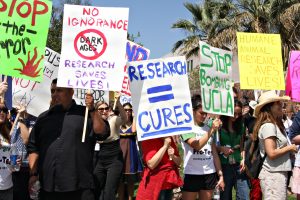Diamond Smith has struggled with excessive facial hair since the age of fifteen. She would shave her face in the morning and then notice the hair returning later in the evening. At that time, Diamond was unaware of the cause of her hair growth. Little did she know that she had a condition known as Polycystic Ovary Syndrome (PCOS). This was a disorder that caused an imbalance of hormones, and was extremely common in women. However, Diamond was unaware of this, and her self-esteem plummeted over time. After years of struggling with her hair growth, Diamond decided to seek help on a medical show called The Doctors. This was a reality show featuring a group of doctors who help find a diagnosis for patients with extreme conditions. In the episode, Diamond opens up about her personal struggles with the hair growth: “I have a beard” she says blatantly.1 Diamond explained that she gets ridiculed everyday by strangers, confessing that they even question her gender at times.

This is not uncommon for those with PCOS, as facial hair on women is still seen as a cultural taboo. Many do not understand that the excess hair growth is due to excess production of testosterone, a male hormone. A more specific explanation requires a clear understanding of PCOS. As it is an ovarian-based disease, PCOS affects a woman’s menstruation cycle and the hormones produced at that time. Normally during a women’s menstruation, a hormone known as FSH is secreted to the ovaries. This allows the eggs to mature and secrete another hormone known as estrogen, which causes the eggs to be released and either be fertilized, or shedded at the next menstruation cycle. In women with PCOS, too much estrogen is produced and causes the eggs to not mature. Instead they remain as fluid-filled sacs known as cysts, which are not shed during menstruation. This causes an array of symptoms, including irregular menstruation cycles, infertility, acne, and hirsutism (excessive hair growth). The hirsutism is caused because there is too much insulin in the blood, along with too much estrogen. The combination causes high levels of testosterone to be produced, which leads to abnormal hair growth and acn.2

Initially, the hair growth was slightly excessive, but still tolerable. Diamond would only have to shave once a week, and although people sometimes teased her, she was hardly affected by it. Once she entered her twenties, her condition worsened dramatically. Diamond began to shave daily, but her facial hair was still visible. On the show, Diamond dismally explained how she would try hair removal creams and waxing in hopes of diminishing the hair growth. Unfortunately, this did not improve her condition:”it just keeps coming back” she says on the episode. It takes three hours for Diamond to get ready for her day; she shaves her face before applying layers upon layers of foundation. Although Diamond tries her best to disguise her condition, people still notice and make rude remarks.“The amount of self-pity I put myself through every single day, it hurts,” Diamond says, as she breaks down in front of the studio audience. At this point, Diamond is still unaware that she has PCOS. In fact, Diamond believes that she caused the excessive hair growth. She wishes to have never shaved in the first place. “If I never would have shaved my face, maybe it wouldn’t have grown as bad as it did,” she says. When asked about the hardest part of her condition, Diamond said it was isolation from her family. “I want to stay home,” she says, instead of going out in public to be ridiculed.3 Diamond does not own any social media, and has isolated herself from the public because she is extremely embarrassed.
Diamond has been reluctant to receive a diagnosis in the past because she feared the results. However, she decided at twenty-three to find a proper diagnosis for her condition. In the episode, Diamond met with OBGYN specialist Dr. Nita Landry, for a consultation. Since excessive hair growth is a sign of androgen production, an ovarian-based disease was suspected. There are a few ways to diagnosis PCOS. The three defining characteristics of PCOS is hyperandrogegism (excess testosterone), irregular menstrual cycles, and having one or multiple cysts in the ovaries. Similar to Diamond, 80% of women with symptoms of excess androgen have PCOS. Since hyperandrogegism causes excessive hair growth, hirsutism is a common symptom of PCOS. Therefore PCOS can be diagnosed simply through physical appearance. The patient may have hirsutism, moderate acne, or other physical symptoms such as weight gain or hair loss. If the patient has three or more of these symptoms, they most likely have PCOS. Another method to diagnose PCOS is through a pelvic exam.A pelvic exam allows any problems with the ovaries or uterus to be detected, which is another sign of PCOS. Blood tests can be used to detect high levels of male hormones, but can also be used to check insulin and cholesterol levels.

Additionally, a more technical method for diagnosis involves an ultrasound of the ovaries. The ultrasound will reveal abnormal follicles, or cysts in the ovaries. The cysts are indicated by the large circular black dots within the ovaries. 90% of women with hirsutism are also found to have polycystic ovaries through the ultrasound. The hirsutism can be evaluated used the Ferry-man-Galley scoring system, which ranks the growth of hair between a scale 1-8.4 The intensity of PCOS can range from mild to severe. Although Diamond has a serious form of hirsutism, 50% of women with PCOS have a much less severe case. Additionally, there may be lower androgen levels, or only a few cysts in the ovaries. Nonetheless, all of these methods are effective ways to diagnose PCOS.
In the episode, Dr. Landry informed Diamond that she will do some blood work and an ultrasound to find out what’s wrong. She then asked Diamond if she had ever been depressed because of the hair growth. Diamond admitted to having depression as well having thoughts of self-harm. Diamond said how comments from other people replay in her head over and over again. Dr. Landry comforted Diamond, and assured her that there will be a solution. “Although we’re here to address the hair growth, we also need to address the emotional aspect of this,” she tells Diamond. Studies have shown a correlation between women with PCOS and mental illnesses such as depression, anxiety, and bipolar disorder. The exact cause for this is unknown, but scientists speculate that it is due to the insulin resistance and hormonal imbalance. Women with PCOS may also feel unhappy with their physical experience and have personal trouble with their femininity. This was the case for Diamond, and the cruel remarks made by strangers have severely affected her. Dr. Landry understood the emotional turmoil Diamond has been through. “At the end of the day, I want you to feel good when you look in the mirror,” she tells her.
Diamond returned to the show after a few weeks for her results. She nervously awaited her diagnosis, and sat with the rest of the doctors in front of the studio audience. Dr. Landry then explained that PCOS is the most likely condition from Diamond’s results. She assured her that Diamond did nothing to cause this and that there may be a genetic link to the disorder. Diamond then revealed how other members of her family have been struggling with this.3 Although the exact cause is unknown, there is a strong correlation between genetics and symptoms of PCOS, such as insulin resistance and hormone levels. Researchers predict that there is not a single PCOS gene, but various genes that are expressed.6 This is why PCOS has a wide range of symptoms and develops differently for each woman.7 Dr. Travis, another doctor on the panel, explained how PCOS is one of the most common endocrine disorders in women. As part of the show, Diamond was able to receive five sessions for advanced laser skin care for her hair growth. The doctors on the show also wanted to treat Diamond’s emotional turmoil, and provided her with three free sessions with a licensed therapist. Diamond expressed her gratitude on the panel. “I’m happy, I’m thankful,” she says, although she still feels incredibly insecure. “I want people to see me for me,” she pleads. The doctors on the panel comforted Diamond and certified that she would feel better soon. Although Diamond’s main concern was the excessive hair growth, there are several other risks for PCOS as well. This includes heart disease or Type 2 diabetes due to insulin resistance.8 Diamond was also appointed to meet a doctor regularly to ensure that the underlying symptoms of PCOS was also being treated.

A few months later, Diamond returned to the show with an incredible transformation. She looked stunning on stage as she greeted the doctors with a warm smile. She continued to radiate on stage. “I feel great, I feel wonderful.” It was evident how much her confidence had grown after the treatment.9 Diamond was able to remove most of her excessive hair growth through the laser treatment, but she was also prescribed the appropriate medication for the other symptoms of PCOS. While this is one way to treat PCOS, a healthy lifestyle has been shown to decrease the symptoms of PCOS significantly. Although Diamond wanted to eradicate her facial hair, other women with PCOS have grown to embrace it. This includes Harnaam Kaur, a British model and anti-bullying activist, and Annie Jones. Annie was part of Barnum & Bailey’s circus in the 1800s, and was referred to as “The Bearded Lady.” Whether women with PCOS decide to embrace their excessive hair growth or not, it is important to be mindful of how our words impact others. Hopefully, knowing the underlying causes of excessive hair growth will help us be more enlightened about this condition in the future.
- Why Am I Growing A Beard? | The Doctors, video file, 5:13, YouTube, posted 2016, https://www.youtube.com/watch?v=_Z6bL7yReJY. ↵
- Polycystic Ovary Syndrome | PCOS | Nucleus Health, video file, 5:27, YouTube, posted 2011, https://www.youtube.com/watch?v=FsNKyKS7M_s . ↵
- “Woman with Beard Gets Diagnosis,” video file, 5:09, YouTube, posted 2016, https://www.youtube.com/watch?v=0R03Xsvh6IQ. ↵
- Adam Felman, “What to know about hirsutism,” January 2019, Medical News Today (website), https://www.medicalnewstoday.com/articles/182659.php. ↵
- “Woman with Beard Gets Diagnosis,” video file, 5:09, YouTube, posted 2016, https://www.youtube.com/watch?v=0R03Xsvh6IQ. ↵
- Mohgah Elsheikh and Caroline Murphy, Polycystic Ovary Syndrome (Oxford: OUP Oxford, 2008), 20-21. ↵
- “Polycystic ovary syndrome (PCOS), Mayo Clinic (blog), https://www.mayoclinic.org/diseases-conditions/pcos/symptoms-causes/syc-20353439. ↵
- Gaber Kovacs, Polycystic Ovary Syndrome (Cambridge, UK: Cambridge University Press, 2000), 26, 44-55. ↵
- “Woman Plagued by Excessive Facial Hair Returns with an Amazing Transformation,” video file, 4:05, YouTube, posted 2017, https://www.youtube.com/watch?v=FI-k9mpBmWc&t=74s. ↵



101 comments
Trinity Casillas
Reading how the doctors also wished to evaluate Diamond’s mental health along with underlying health conditions that the hair growth was a symptom of gave me a sigh of relief. Mental health is just now, unfortunately, becoming a topic of decision for many so any little progress makes me happy to see. Their thoughtfulness also surprised me because I assumed the presence of a tv audience would cause some lost in credibility but they impressed me greatly.
Sofia Martinez
This is one article I like for its wonderful message; it does not matter your imperfections, you can always be educated enough to understand that it still not okay to bully and make other people feel self-conscious and depressed about their apperaence. Definitely when it is a condition that cannot be fixed, and you know that it is something that they are struggling with, it will not better our widely spread problem in American because of women and their specifically put standards.
Ivonne Orozco
When I think about how people discriminate others based on their looks, it makes me truly upset. It is sad to see how Diamond was embarrassed to even go out in public. For many years , we have seen how people have had to live with fear of being judged because of their appearance . This article was written amazingly. I absolutely loved how in the end of the article, the author mentioned that it is important to be mindful of our words and how they impact others. Our words can be our strongest power sometimes.
Victoria Davis
People are so quick to discriminate what is against the norms that society has. Situations like this there is no choice for Diamond, but to embrace her condition that she did not ask for. The world we live in today has no sympathy for one another, even from keeping herself isolated from her family. The statistics really allow people to see facts that this isn’t something she can control, but is medical.
Ashley Martinez
Still to this day our society is very judgemental and critical. This is very awful to see people put others down because of their physical appearance. Diamond Smith is a young woman that struggled with a condition known as Polycystic Ovary Syndrome. This condition affects the woman’s hormones and as well as their menstrual cycle. Diamond Smith had excessive facial hair due to her body producing a surplus of testosterone. This condition Diamond struggled with truly affected her mentally to the point where she was depressed. I think every individual is made in a unique way for very different reasons. It is important to embrace what makes you different because it is who you are and who you are is beautiful. We as a society cannot be setting standards of what perfect should be, everyone is perfect in their own ways. Instead of focusing on what makes everyone different we should focus on encouraging and raising others up by spreading positivity.
Analisa Cervantes
Although we are in a new-ish century, people as a whole still believe in stereotypes and discriminate others. It is sad to see the struggles this woman has been through. Society needs to focus more on helping each other then shaming us for our looks. This was a well-written article and very descriptive about what PCOS is and how it affects women.
Lauren Keller
Self confidence plays such an important role in how we feel and carry ourselves through everyday life. It is truly sad how Diamond Smith’s confidence was damaged by the ridicule of others and over a condition she did not choose to have. This treatment by others reflects how heavily influenced we are as a society by these beauty standards shown to us in the media of what is considered “acceptable” and how, if you do not fit these standards, you could be subject to judgement from others. Diamonds case also shows how harmful words can be to one’s mental health and can lead to thoughts of self-harm and depression. However, I am glad that Diamond’s condition was diagnosed and that she was given the proper medication for her other symptoms. In addition to this, I’m glad that Diamond’s confidence has grown and that she feels comfortable in her own skin.
Alexis Aranda
It is tremendously upsetting that a woman, with so much warmth and kindness to her, felt almost tied to her home in fear of going out into the world because of how she looks. Society places an immense amount of unrealistic standards on women and how they should look and present themselves to the public. Obviously there is no format or formula for beauty, but the media makes it seem that way. People are basically groomed to reject the idea of women looking any different than the way they look on ads or films, which is why it is no surprise that this woman had to live a lifetime or pain and hurt due to bullying and teasing. With this being said, I think society has collectively failed time and again by setting up these ridiculous standards. The fact that she has facial hair does not and should not make her any less of a woman, because some woman even have genitals though that is another discussion. What I am trying to convey is that being a woman should not be determined by the amount of facial hair she has, and it is unfortunate that she was bullied until thinking it does. I enjoyed the way this article was written so clearly and well through out.
Montserrat Moreno Ramirez
Stereotypes have led to discrimination within a society, and for me this article is the perfect example. This woman had to go trough plenty of people making fun of her, reject her, and simply abusing her in many ways. I think society needs to improve their way of thinking and acknowledge that we are all the same regardless of our physical appearances.
I understand that having a beard is odd in a women but that doesnt make her less or makes it ok to make fun of that person, because sometimes we dont know the length that our words may have in the mind of that person we are insulting.
Montserrat Moreno Ramirez
Stereotypes have led to discrimination towards people, and for me this is a perfect example. This young lady had to go trough plenty of people making fun of her, reject her, and simply abusing her in many ways. I think society needs to improve their way of thinking and acknowledge that we are all the same regardless of our physical appearances.
I understand that having a beard is odd in a women but that doesnt make her less or makes it ok to make fun of that person, because sometimes we dont know the length that our words may have in the mind of that person we are insulting.